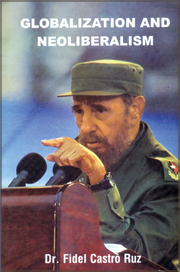|
Insights into globalisation and neo-liberalismLITERATURE: Dr. Fidel Castro Ruz, the President of Cuba turned 80 this year, and quite a number of books have been launched to mark the occasion. Many books are published on the various issues raised by Dr Castro from time to time via lectures, key note addresses, and messages over the years. Being a long-time Sri Lankan scholar on the subject, the senior journalist and the Sri Lanka National Committee for Solidarity with Cuba president Jayatilleke de Silva has compiled some of Castro's speeches on the subject of globalisation and neo-liberalism, which presumably will help some of our own counterparts in the field of political sciences and allied subjects to acquire more knowledge and information.
According to the compiler, the subject or the concept of globalisation is an objective historical process, which is irreversible, and he quotes Dr. Castro: "the problem is not globalisation per se, but rather the type of globalisation." Having laid down this statement, Castro makes an attempt to look at the concept from various points of view. In a lecture delivered at the Central University of Venezuela, February 3, 1999, he further clarified the clear definition in these words: "in our view, globalisation is nobody's whim, It is not even anybody's invention. Globalisation is a law of history. It is a consequence of the development of productive forces. It is a consequence of scientific and technological development, so much so that even the author of this phrase Karl Marx, who had great confidence in human talent, possibly was unable to imagine it. Certain other things remind me of some of the basic ideas of that thinker among great thinkers. It comes to one's mind that even what he conceived as an ideal for human society could never come true and this is increasingly clear if it was not in a globalised world" [p1]. Then he tries to juxtapose the basic view on neo-liberalism, as connected to globalisation as follows. Private property"The concept or the force, neo-liberal globalisation wants to turn all countries, especially all our countries [special emphasis is laid on the third world countries here] into private property. What will be left for us of their enormous resources? They have accumulated an immense wealth, not only looting and exploiting the world, but also working in the miracle alchemists longed for in the middle ages turning paper into gold. At the same time they have turned gold into paper and with it buy everything, everything but souls-more accurately said-everything but the overwhelming majority of souls. They buy natural resources, factories, whole communication systems, service, and so on. They are buying even land around the world assuming that being cheaper than in their own countries. It is a good investment for the future." One would wonder how well, thought and how well expressed on the global observation, especially as applied to the third world conditions. Castro then underlines how he, with his colleagues, managed to safeguard the interests of their land, with a political vision of their own, as against evil forces and combated to the point that he had the greatest challenge from his enemy countries, where capitalism flourished. In a tone of irony, he says we must ponder over these matters scientifically, and reach our own conclusions, rather than depending on others' ideologies, and as such obviously, it is reasonable for people to have food, health, a roof over their heads, clothing and education plus adequate rational sustainable and secure transportation means, culture recreation, and a broad variety of options and many more things aspired as human beings, perhaps a private jet or a yacht depending on the social and economic conditions affordable. Castro states of his finding amusing some of the writings of the so-called political thinkers, who theorize the concepts of globalisation and neo-liberalism connected to it, as they possess contradictions in the ultimate analysis. He selects one such contribution from a prolific contributor on the subject [George Soros: Global Crisis], and states that the book that theorizes may not help address the issues of globalisation, and neo liberalism in the best possible perspective. Broader perspectiveHe too emphasises that though the private property holders, who have made some of the countries look rich but from a broader perspective they can cause an economic catastrophe to the rest of the world in terms of enormous sums of money saved from loans from banks. In this direction he makes mention of the case of Bill Gates as an example, who had obtained loans from fifty banks [p9]. In his addresses he makes the reader feel that the great richness may mean from another standpoint a factor of destabilisation caused through the plunder and exploitation, and as such, from his point of view, the richest countries are setting rules and requirements that better suit them and look forward to the day when they are free from taxes and tariffs. One of the eye opening concepts being the facts he lays down in terms of third world conditions, where the people are driven to a form of modern slavery, the cheap-man-power flooding the free trade zones in their own lands, and the introduction of worst paid salaries at the maximum consumerism levels [p.17]. With these as the background, Castro introduces a dialogue, essential to realize the globalisation's potential [in an address to the ministerial meeting of the group of 77, Havana September 19,1999]. He states that globalisation is the historical process that defines the world scenario, as this millennium draws to an end. He emphasizes that globalisation is an irreversible reality characterized by the growing interaction of all countries in the world, their economies and peoples. In his opinion, major scientific and technical advances have shortened distances and allowed for direct communication and transmission of information among countries located anywhere on the planet [p19]. But this situation, according to his observation and the analysis, is linked with the neo-liberal policies that impose unregulated markets and unbridled privatisation. Thus he says that far from promoting the expansion of development throughout an increasingly interdependent world, badly in need of sharing the progresses achieved, neo-globalisation has aggravated existing inequality raised to inordinate heights social inequities and the most irritating contrasts between extreme wealth and extreme poverty.[19] Then Castro builds up the theory that while globalisation is an objective reality neo-liberalism is a disaster [in his speech at the opening session of the South Summit on April 12,2000 in Havana]. It is interesting to note that some of the sayings of Castro have gone down the history as epoch-making utterances and revolutionary visions. One is 'homeland or death'; the other, 'we either unite and establish close cooperation or we die'. The last speech, included in the collection, is an insight into the conditions existing in the third world, where the factors of unemployment, the comparison of consumer levels in the first world and the third world, and factors that lead to hunger and starvation. Summarising, he says that hunger continues to be a daily reality for 852 million people, while trillions of dollars are spent on weapons that kill the hungry, and not hunger; extremely thought provoking and refreshing. This compilation helps the reader transcend the narrow barriers of political thinking. |
|
.................................. |










